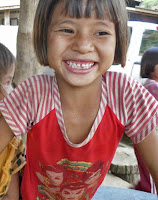The throwing of water originated as a way to pay respect to people, by capturing the water after it had been poured over the Buddhas for cleansing and then using this "blessed" water to give good fortune to elders and family by gently pouring it on the shoulder. However, now, people line the streets with buckets, fill pick ups full of water bins and spend two days getting each other thoroughly drenched. It's hilarious.

 We rented a pick up for a couple of days, piled the kids in the back, tooled up with water pistols and joined in. Needless to say, as there are precious few farang in Chiang Rai, we became something of a target. And believe me, they don't just go for the people who are joining in! I headed out on my own on my bike to get dinner one night and was thoroughly soaked on the way into town. By the time I reached my destination, I was dripping wet, my African sandals had distintegrated so I was sort of hopping along the street and the restaurant I wanted to go to laughed at me and told me to sit on the wicker chairs. Ha.
We rented a pick up for a couple of days, piled the kids in the back, tooled up with water pistols and joined in. Needless to say, as there are precious few farang in Chiang Rai, we became something of a target. And believe me, they don't just go for the people who are joining in! I headed out on my own on my bike to get dinner one night and was thoroughly soaked on the way into town. By the time I reached my destination, I was dripping wet, my African sandals had distintegrated so I was sort of hopping along the street and the restaurant I wanted to go to laughed at me and told me to sit on the wicker chairs. Ha.










